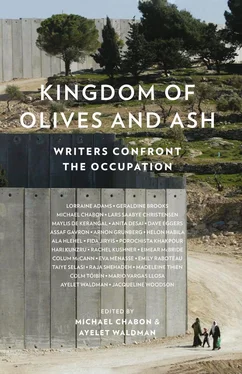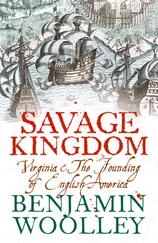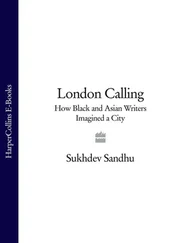That evening, my partner and I went back to our hotel room, turned on our computer, and exhaled to dispatches from the New Hampshire camp. Our children were safe. Our children were happy. But we were different now. With us, we carried those crying boys.
IN THE WEEKS BEFORE LEAVING, OUR FAMILY SAT DOWN TO DINNER EACH evening, inside our brownstone built in 1878, around a table that we had owned for four years, passing dishes that we could easily replace at Ikea should they become chipped or broken. We moved inside our bubble of comfort easily, save me, with my head halfway in a place that was as foreign and frightening as ignorance. As palpable as the daily news.
What I “knew” about Israel-Palestine was that it was a dangerous place, a place where buses full of people exploded at midday and small boys ran through the streets aiming semiautomatic weapons at innocent passersby. The Israel-Palestine I thought I knew was not a place nice Jewish women (my partner) step into and out of unharmed. I knew the Palestine-Israel of newspaper articles and television journalism. This Palestine-Israel was as foreign to me as Yemen, a place somewhere out there where people who had no connection to me fought among themselves—and killed others. People who were not 100 percent people … how could they be? They were outside my very comfortable America. Outside anything I could—or needed to—imagine. Daily reports of the devastation of the occupation fell on ears attuned more to domestic tragedies—the overshadowing of police brutality, my own people dying. If I couldn’t change this, what could I change? The reports again and again of Jews and Palestinians dying arrived to me in murky shadow. Bloodless. Boneless. These were not schoolchildren who begged for an extra sweet, not mothers lifting a breast to a newborn’s mouth. Not that same newborn instinctively lifting her head to meet it. No boys outside a checkpoint, gates locked, soldiers walking away. When will it open again? I asked the people with me. It could be hours. The soldiers decide. No. If I couldn’t save my own people, why even begin to imagine the murky shadows as fully human?
My own people dying.
What I know now is that there is no longer such a thing as one’s own people .
IN UMM AL-KHAIR, A BEDOUIN VILLAGE IN THE SOUTH HEBRON HILLS, an artist named Eid Hthaleen served us sage tea in tiny, beautiful glasses. We sat on rugs underneath a large canopy, our shoes left just outside. In the hills beyond the tent, we could see his thin goats moving over the land. We could see the makeshift homes, built from tin and plastic and tarps. Beyond that, the piles of metal where soldiers had come in with orders to destroy the homes. Small children looked at me wide eyed. A dark man, nearly toothless, chain-smoked, his fingertips yellow. During a silence, he turned to me and asked through a translator, What is going on in your America? Why are they killing all the black people?
I couldn’t answer.
I do not know. Later, Eid took us to his studio, a tiny lean-to outside a small stone two-room home. He showed us the amazing trucks he had made—tiny renditions of the bulldozers and eighteen-wheelers that had come to destroy past homes, built from the materials and leftover metals of that destruction. This home, he said, was also under orders to be destroyed. All the structures were. He didn’t know where he’d go with his family from here. He didn’t know where the other families would go. They had been living on this land for over half a century. It’s land , Eid said. It will be here long after we’ve all stopped fighting over it.
SOME MORNINGS, WHEN I’M FEELING BRAVE, I PULL MY BLACK IS BEAUTIFUL T-shirt over my head—black shirt with white lettering; the people I pass either smile or glare or look surprised. My pro-Blackness is not antiwhite. This shirt isn’t my own middle finger thrown up into the air but rather an expression of my belief that love can exist for the self without annihilating others. Why is it I wear the shirt only when I’m feeling strong enough?
In Israel-Palestine, I meet both Israeli and Palestinian activists working hard toward creating a safer, freer, fairer nation. I take a bus to the Qalandiya checkpoint and watch the Palestinians moving slowly through it on their way to work. The checkpoint is a high structure of razor wire, iron bars, and metal detectors. IDs must be shown, and sometimes, for reasons no one can explain, people are not allowed to go through, losing days, sometimes weeks of work. A small white-haired Israeli woman, Hanna Barag, arrives early in the morning, to bear witness, to fight for the rights of the Palestinians, to help people move through their days, live their lives, feed their families. I watch her, see the hope in her actions, see the hope in the faces of the Palestinians who know who she is and why she’s there. The checkpoint reminds me of Comstock, Coxsackie, Elmira—the many prisons I saw as a child visiting my incarcerated uncle. In the heat of the early morning, I watch the people move slowly through, their heads bowed, their IDs held out hopefully—and I wonder what crime brought them to this moment. And I know, it is simply the crime of the accident of their birth. And the crime of a nation, of many nations, refusing to see people … as people.
In Hebron, a small red-haired Palestinian boy points to my hair and says It’s not real. Your hair isn’t real! I let him touch it and he yanks it hard. I do what any mother does. I yank his hair back. He is surprised. And then he laughs. I am as surprised by a red-haired Palestinian as he is by a brown-skinned Afroed woman. And then we aren’t surprised. We are just who we are.
I AM ONE OF THREE BLACK PEOPLE ON THE PLANE TO ISRAEL-PALESTINE. A dark man with a yarmulke waves to me. Do you know him, the flight attendant wants to know. I smile at her, silent as bone, my back and voice tense for the journey. I am a mother. A partner. A writer. In Brooklyn, I have a life filled with people whom we share Sunday dinners with and have done so, with only a few misses, for fourteen years. We are well versed in Bordeaux and politics. We laugh a lot and comment on our children’s pituitary glands—how did this come to pass so quickly, that this one is taller than I am now and that one is about to graduate from high school, college, a master’s program? A voice comes over the intercom in Hebrew. My partner takes my hand, tells me again that her own parents used to fly in separate planes lest something happened and their three children were left parentless. And beyond the plane, I want to ask. What then?
The camp in New Hampshire has every auntie’s phone number from New York to Vermont to California. I remember again that we still haven’t gotten to our will. My sister will know what to do. Or maybe she won’t.
MEMORY IS STRANGE. AS I WRITE THIS MONTHS LATER, WHAT I KNOW IS that my fear of Israel-Palestine, like so many fears, was one of ignorance, the unknown, the backstory of others brought into my own present. There is a quiet loveliness to the people of Palestine. Before you can remove your sandals and step into their homes, there is the offering of tea, the shy bowed heads of both the women and men, followed by the warm smiles often reflecting the tortured teeth of poverty. There is the deep heat of a moral core moving through the bodies of Israeli activists—a true belief in justice and equality for all people, a not-looking-away-ness from the pain that is this moment in Palestine-Israel. For many years, I stood outside these worlds. And then I stood inside my fear. Slowly, a bit reluctantly, I stepped inside, opened my eyes, touched, tasted, smelled, and pulled at the hair of a world I had tried to not see, to not know.
It’s not real, the boy said, pulling my hair. But like thirteen-year-old Ahmad Abdullah Sharaka, and twelve-year-old Tamir Rice, and eleven-year-old Abdul-Rahman Obeidallah and seventeen-year-old Dania Jihad Irshaid and eighty-four-year-old Marilyn May Bettencourt and the hundreds of Palestinians and African Americans killed between 2015 and 2016, my hair is as real as their bodies, as thick as their family’s grief, as dark as the blood that flows and continues to flow—from the United States to Israel-Palestine.
Читать дальше











